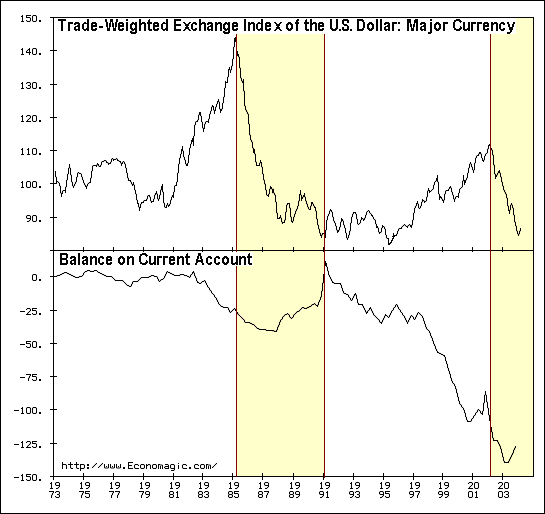The U.S. current-account -- essentially the checking account for the country-- shows the difference between what U.S. sold to the world and the world has sold to us.
The deficit in the current account has been growing larger for two decades. The deficit hit $164.7 billion in the third quarter of 2004, up 50 percent from $109.8 billion in the last quarter of 2000 when Bush took first office in January 2001.
What troubles economists is the fact that the deficit is approaching 6 percent of GDP, a record size relative to the overall economy. Already, the U.S. has to import $1.8 billion in foreign savings every day to pay for our appetite for imported goods.
Europe and Japan are on the other side of the equation, selling more to U.S. consumers than their citizens are buying from America. China also is sending massive exports to the U.S. while keeping its currency low to also keep the favorable terms of the trade flowing.
How long can this situation continue? Economists don't pretend to know. But economic logic suggests it can't last throughout the next four years of the Bush presidency. History suggests the debtor country will bear the brunt of any adjustment, says Robert Brusca, chief economist at FAO Economics.
Bush policy key
The outline of a solution to U.S. dependence on foreign capital isn't in serious dispute: Higher savings in the United States, a reduction in the growing federal budget deficit and less spending by U.S. consumers, meaning lower GDP growth since consumer spending comprises two-thirds of GDP.
Another important factor has been faster growth in Europe and Asia. Some say the value of the dollar must decline further against foreign currencies to improve U.S. competitiveness. And here is where things get sticky.
The dollar already has dropped 50 percent against the euro and 24 percent against the yen since a peak in February 2002. Europe and Japan are balking at the prospect of any more weakening.
The Chinese currency has remained pegged at 8.3 yuan per dollar since 1995 and the political leadership of China has been wary of altering this anchor. The Chinese political elite are worried that a stronger currency would increase the unemployment rate in China, creating political unrest.
Analysts say the Bush administration may have to lead a coordinated global response to unwind the deficit in a smooth and orderly fashion.
"You would need to see President Bush getting domestic consensus for some increase in national savings and have the U.S. resume its leadership in terms of global policy coordination," el-Erian says.
If the White House doesn't take these steps, "the adjustment burden will be undertaken by the market," el-Erian says. "The risk here is you get a collapse of the dollar and a spike in market interest rates."
The fact the United States is the world's largest debtor nation is a dark cloud looming over President Bush's second term. There are two components of any budget - income and outgo.
The Dems could care less about spending. For all of Bush's propensity to spend our tax dollars, he could never spend enough to satisfy them.
Their sole objection is that we don't tax enough. And we should never lose sight of that fact when Dems try to lecture us about fiscal responsibility.
As I've said before, it's ridiculous to blame the current account deficits on Bush. Whatever you make of this situation, he inherited it.
Here's a chart from last April that shows the basic picture. Ignore the top chart, which is not immediately relevant. The bottom chart shows the current account. As you can see, there were earlier problems which were corrected, but that the deficit really fell out of bed just about the time clinton came into office, and has been getting worse ever since.
Naturally, the media are all blaming Bush.

